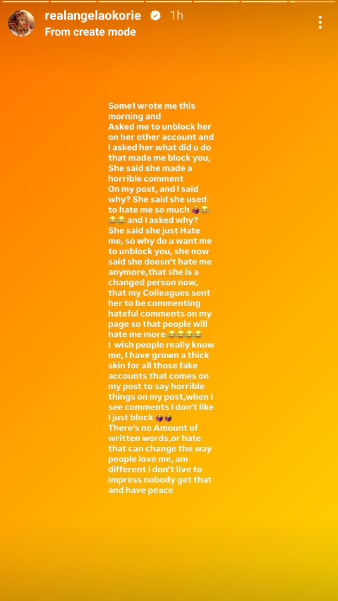Prominent Nollywood actress Angela Okorie has come forward with a startling revelation about orchestrated online harassment campaigns. The actress recently shared her experience with a former critic who approached her with an unexpected confession after being blocked for persistent trolling.
According to Okorie’s account, what initially appeared to be a case of typical social media negativity has unveiled itself as something far more calculated. The former critic, whose identity remains undisclosed, reached out to the actress requesting to be unblocked, but it was the reason behind their previous behavior that proved most illuminating. In a surprising disclosure, the individual claimed that their negative comments and harassment were allegedly instigated by some of Okorie’s industry colleagues.
This revelation opens up a broader conversation about the nature of social media interactions in the entertainment industry and the potentially orchestrated nature of what many assume to be organic criticism. The situation highlights a concerning practice where industry professionals might be using social media as a tool for undermining their colleagues through proxy accounts and manufactured controversy.
The actress’s decision to share this information comes at a time when conversations about social media ethics and the impact of online harassment on mental health are gaining increased attention in the entertainment industry. By choosing to speak out, Okorie has potentially exposed a systematic issue that may be more widespread than previously acknowledged.
The impact of such revelations extends beyond individual cases of harassment. It raises serious questions about professional ethics within the Nigerian entertainment industry and the potential manipulation of public perception through coordinated social media campaigns. The practice of using social media followers as pawns in industry rivalries represents a troubling evolution of traditional entertainment industry competition.
This situation also highlights the complex power dynamics at play in social media interactions between celebrities and their followers. What appears on the surface as simple fan behavior or criticism might, in fact, be part of a more sophisticated strategy to influence public opinion or damage reputations. The revelation that industry professionals might be orchestrating such campaigns adds a layer of complexity to how we understand celebrity-fan interactions in the digital age.
The development takes on additional significance given the growing importance of social media presence in the entertainment industry. For many artists and actors, social media platforms serve as crucial tools for career advancement, fan engagement, and brand building. The possibility that these platforms are being weaponized for professional sabotage raises serious concerns about the integrity of online discourse in the entertainment space.
Industry observers note that this incident could potentially lead to broader discussions about the need for professional ethics guidelines regarding social media behavior among entertainment industry professionals. The revelation might also prompt calls for more transparency in how social media is used within the industry and the potential need for mechanisms to protect artists from coordinated harassment campaigns.
For Okorie, the decision to share this information appears to be part of a larger effort to shed light on industry practices that often remain hidden from public view. By bringing these issues to the forefront, she has initiated what could become a significant conversation about accountability and professional conduct in the digital age.
The incident also raises questions about the responsibility of social media platforms in addressing coordinated harassment campaigns, particularly when they are revealed to be professionally motivated rather than genuine expressions of public opinion. This could potentially lead to calls for more sophisticated moderation tools and policies specifically designed to address industry-specific forms of harassment.
As this story continues to develop, it may serve as a catalyst for broader industry reform and a reassessment of how social media interactions are managed within the entertainment community. The courage shown by both Okorie in sharing this information and the former critic in coming forward with their confession might encourage others to speak out about similar experiences, potentially leading to a more transparent and ethical entertainment industry environment.




